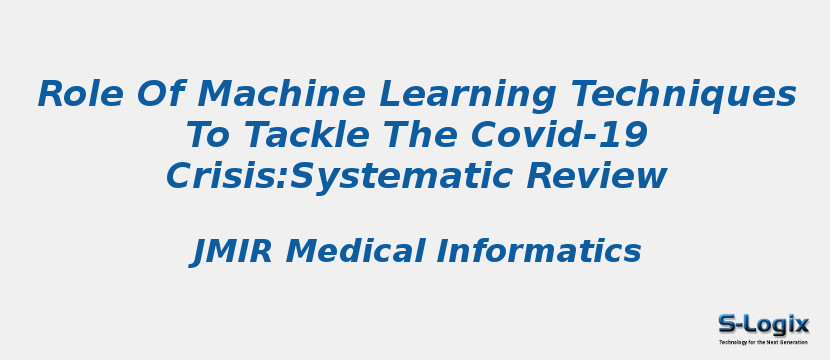Research Area: Machine Learning
Background:
SARS-CoV-2, the novel coronavirus responsible for COVID-19, has caused havoc worldwide, with patients presenting a spectrum of complications that have pushed health care experts to explore new technological solutions and treatment plans. Artificial Intelligence (AI)–based technologies have played a substantial role in solving complex problems, and several organizations have been swift to adopt and customize these technologies in response to the challenges posed by the COVID-19 pandemic.
Objective:
The objective of this study was to conduct a systematic review of the literature on the role of AI as a comprehensive and decisive technology to fight the COVID-19 crisis in the fields of epidemiology, diagnosis, and disease progression.
Methods:
A systematic search of PubMed, Web of Science, and CINAHL databases was performed according to PRISMA (Preferred Reporting Items for Systematic Reviews and Meta-Analysis) guidelines to identify all potentially relevant studies published and made available online between December 1, 2019, and June 27, 2020. The search syntax was built using keywords specific to COVID-19 and AI.
Results:
The search strategy resulted in 419 articles published and made available online during the aforementioned period. Of these, 130 publications were selected for further analyses. These publications were classified into 3 themes based on AI applications employed to combat the COVID-19 crisis: Computational Epidemiology, Early Detection and Diagnosis, and Disease Progression. Of the 130 studies, 71 (54.6%) focused on predicting the COVID-19 outbreak, the impact of containment policies, and potential drug discoveries, which were classified under the Computational Epidemiology theme. Next, 40 of 130 (30.8%) studies that applied AI techniques to detect COVID-19 by using patients’ radiological images or laboratory test results were classified under the Early Detection and Diagnosis theme. Finally, 19 of the 130 studies (14.6%) that focused on predicting disease progression, outcomes (ie, recovery and mortality), length of hospital stay, and number of days spent in the intensive care unit for patients with COVID-19 were classified under the Disease Progression theme.
Conclusions:
In this systematic review, we assembled studies in the current COVID-19 literature that utilized AI-based methods to provide insights into different COVID-19 themes. Our findings highlight important variables, data types, and available COVID-19 resources that can assist in facilitating clinical and translational research.
Keywords:
Machine Learning
Covid-19 Crisis
Computational Epidemiology
Early Detection and Diagnosis
Disease Progression
Author(s) Name: Hafsa Bareen Syeda; Mahanazuddin Syed ; Kevin Wayne Sexton ; Shorabuddin Syed ; Salma Begum; Farhanuddin Syed; Fred Prior ; Feliciano Yu Jr
Journal name: JMIR Medical Informatics
Conferrence name:
Publisher name: JMIR Publications
DOI: 10.2196/23811
Volume Information: Volume 9, No 1
Paper Link: https://medinform.jmir.org/2021/1/e23811
